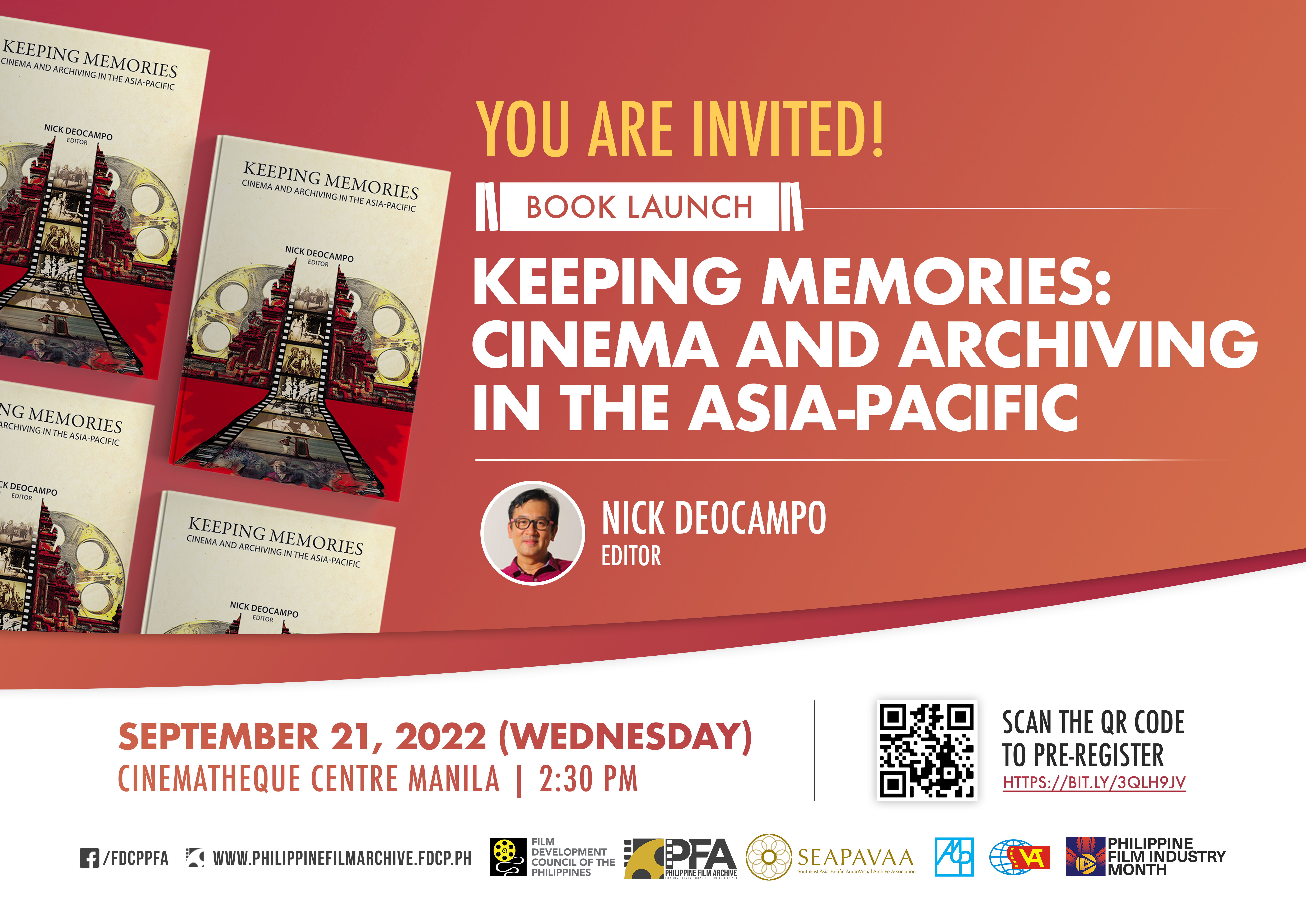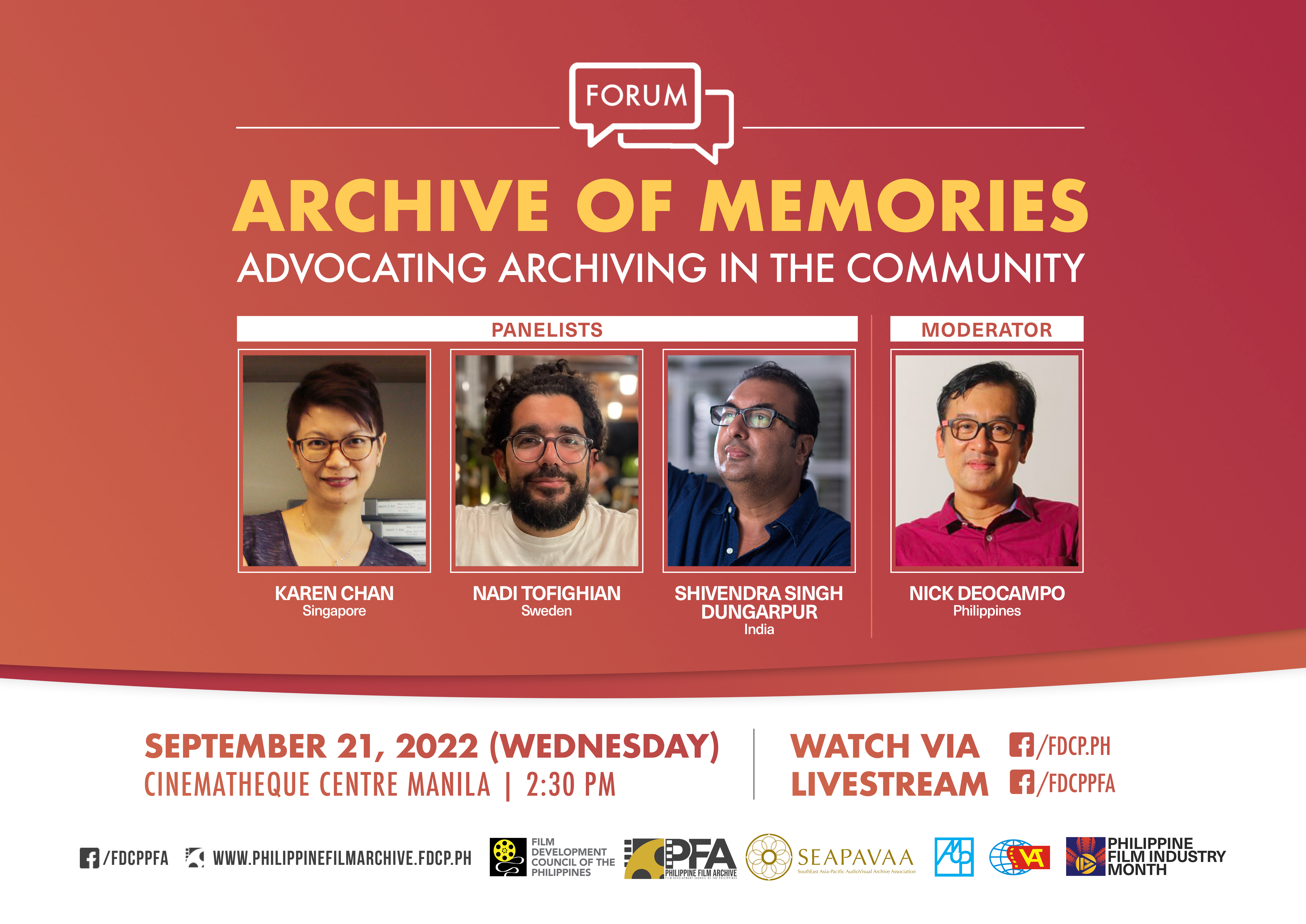Event: Forum and Book Launch – “Keeping Memories: Cinema and Archiving in the Asia-Pacific”
Date: 21 September 2022
Time: 02:00 PM (Philippine Time, GMT+8)
Venue: Cinematheque Centre Manila
Program Host: Jo Andrew Torlao
Livestream: facebook.com/fdcp.ph/; facebook.com/FDCPPFA/
In partnership with the Film Development Council of the Philippines’ Philippine Film Archive and Southeast Asia-Pacific Audiovisual Archive Association (SEAPAVAA), we bring you the launch of multi-awarded filmmaker, film historian, and author Nick Deocampo’s latest opus.
ABOUT THE BOOK
Keeping Memories: Cinema and Archiving in the Asia-Pacific edited by Nick Deocampo brings together film scholars, archivists, film artists, academics, media practitioners, historians, and cultural advocates to share their thoughts that touch the heart of our Asian film heritage. In four themes, the sections in this anthology deal with topics such as Archives and Memory, Archives and National Identity, Archives and the Asia-Pacific, and Archives and Cinema History.
The anthology covers topics as varied as personal meanderings in the region and archival encounters, lacunae in film deposits, archival ambiguities, cinematic imaginaries of nation, pandemic media, digital archive, and “lost” film histories.
“[The book] is for the archivists of the future,” Deocampo writes, “as it is for future filmmakers and historians, scholars, and ordinary movie viewers to harness the use of technology to preserve film medium that has a history rich with memories and filled with legacies from the past.” Hot off the press, Keeping Memories reveals a robust concern for both the cinemas in the region and how they are preserved for the future.
This book is co-published by the Ateneo de Manila University Press, Film Development Council of the Philippines (FDCP), Southeast Asia-Pacific Audiovisual Archive Association (SEAPAVAA), and Vietnam Film Institute (VFI).
Get your copy:
Website: bit.ly/KM-web
Shopee: bit.ly/KM-s
Lazada: bit.ly/KM-lzd
ABOUT THE EDITOR
NICK DEOCAMPO is a filmmaker and film historian. An associate professor at the UP Film Institute in the University of the Philippines, he took up his masters of arts degree in Cinema Studies at New York University as a Fulbright scholar and received his Certificate in Film in Paris, France. An advocate of film archiving, he has written books and articles on the subject, such as Lost Films of Asia, Films from a “Lost” Cinema, Historiography of a “Lost” Cinema, and Envisioning a Rhizomatic Audio-Visual Archiving for the Future. He is a four-time recipient of the Philippine National Book Award, and his publications cover subjects from film history to film literacy. He was formerly chair of the UNESCO Philippines Memory of the World Committee.
ABOUT THE PROGRAMME
| TIME | EVENT | SPEAKER(S) |
|---|---|---|
| 2:00 PM | Registration | |
| 2:30 PM | Program Proper | |
| Opening Remarks | Tirso Cruz III, FDCP Chairman |
|
| Special Message | Karen Chan SEAPAVAA President |
|
| Introduction to the Forum | Moderator: Nick Deocampo, Book Editor |
|
| Forum: Cinema and Archiving in Asia-Pacific | Panelists (Book Contributors): Karen Chan, Asian Film Archive, Singapore Nadi Tofighian Stockholm University, Sweden Shivendra Singh Dungarpur Film Heritage Foundation, India |
|
| Introduction of the Book | ||
| Discussion with Book Contributors | ||
| Closing Remarks | Belina Capul | |
| 4:30 PM | Book Signing | |
| 5:00 PM | Cocktails |
ABOUT THE FORUM
“Archive of Memories: Advocating Archiving in the Community”
The digital revolution has given rise to the explosive production of countless documents, including metadata, images, and moving pictures. From selfies to TikTok, to the countless documentation using audio-visual recordings, the volume of documents and artefacts produced in contemporary times is mind-boggling. This prompts the question: How are all the zillions of data and information being kept and safeguarded? And with the sheer amount of space needed, how are films and moving images archived?
This phenomenal growth has led to discussions to think outside the conventional archiving practice, where archiving is regarded as the sole domain of state-run or institutional archival entities. The volume of digital documents produced is so excessive that no single agency can do the task. One needs to consider new paradigms in archival holdings. One such paradigm is a rhizomatic approach involving a multiplicity of libraries and archives to assume the role of memory-keepers. This is where community archiving finds relevance. Communities and individuals need to become part of the crusade to preserve memories.
Communities need to take an active role in preserving their audiovisual documents. What to keep, how best to keep them, where it is best to keep them, and many other practical issues will be dealt with in this forum.
ABOUT THE PANELISTS
KAREN CHAN is the executive director of the Asian Film Archive (AFA) and the president of SEAPAVAA (2020–2023). In the AFA, she is focused on the development and access of film collections, increasing film literacy, and advocating for preservation. Under her leadership, the AFA is establishing a reputation for its innovative programming, and for creating a new life for films through its restoration and facilitation efforts. Throughout the global pandemic since 2020, she has ensured that the AFA innovated through commissions to collaborations, continuing to support filmmakers, and interdisciplinary creatives, and provided avenues for dialogues and learning. Karen teaches film literacy and film preservation classes to students and the public. She publishes and presents at industry and academic events such as the EYE Film Museum Amsterdam, the Association of Moving Image Archivists (AMIA), and the International Film Industry Conference. She also serves on the Singapore Film Commission advisory committee. Karen was the 2019 winner of the Singapore Women’s Weekly Most Inspiring Woman Award and Arts and Media nominee. Her previous work experiences include the National Archives of Singapore, the National Arts Council, and the Natural History Museum in New York City.
NADI TOFIGHIAN is a research fellow and lecturer at the Department of Media Studies, Stockholm University. Special issues editor for Early Popular Visual Culture. Member of the board for the Swedish Film Institute.
SHIVENDRA SINGH DUNGARPUR is an award-winning filmmaker, producer, film archivist, and restorer. He is the founder of Film Heritage Foundation, a not-for-profit organization dedicated to the preservation of India’s cinematic heritage. Shivendra was elected to the executive committee of the International Federation of Film Archives in 2017. Under the banner of Dungarpur Films, he has directed and produced close to 800 commercials. He made his first feature documentary Celluloid Man in 2012, which won two National Awards and traveled to over fifty festivals around the world. His second documentary, The Immortals (2015), premiered at the Busan International Film Festival and won the Special Jury Award for the Best Film at MIFF 2016. His third documentary, CzechMate–In Search of Jiri Menzel is a seven-hour epic that is an in-depth exploration of the Czechoslovakian New Wave.

